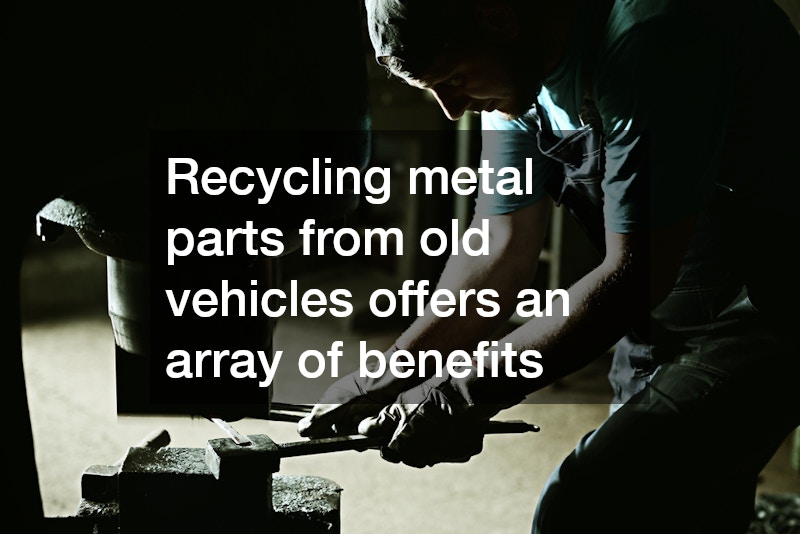Why You Should Recycle Your Old Vehicles Metal Parts
Why You Should Recycle Your Old Vehicle’s Metal Parts
Recycling your old vehicle’s metal parts is a crucial step towards fostering environmental sustainability, economic gain, and pragmatic waste management. As the world leans towards greener initiatives, understanding the multifaceted benefits of recycling becomes increasingly important. This article delves into the environmental, economic, and practical advantages, providing a comprehensive guide on why and how to recycle vehicle metal parts.
How Does Recycling Old Vehicle Parts Benefit the Environment?
Reducing Landfill Waste
Old vehicles and their components significantly contribute to landfill waste, occupying enormous space that could be preserved through recycling efforts. By recycling metal parts from vehicles, we substantially reduce the influx of waste into landfills, diminishing environmental degradation.
Additionally, less waste leads to less pollution, directly benefiting surrounding ecosystems and communities.
With millions of vehicles reaching the end of their lifecycle each year, local metal recycling has become a critical strategy to manage automotive waste sustainably. Diverting even a fraction of these vehicles from landfills could conserve space and extend the operational lifespan of existing waste management facilities. Over time, reducing landfill waste enhances public health and promotes a cleaner, more sustainable environment.
Conserving Natural Resources
Manufacturing metals for vehicles demands extensive mining operations, depleting natural reserves, and stretching environmental costs. Recycling metal parts curtails the need for new raw material extraction, conserving vital natural resources. Using recycled metals in manufacturing processes eases the burden on virgin materials, offering substantial savings in energy and resources.
The steel and aluminum obtained from recycled vehicles are pivotal in various industries, enhancing the efficiency of our resource management. Recycling saves up to 95% of the energy needed to produce new metal from raw ore, which has a profound impact on reducing our collective carbon footprint. This efficient reuse leads to a balanced ecosystem where resources are judiciously conserved for future generations.
What Are the Financial Advantages of Recycling Vehicle Metal?
Getting Cash for Scrap Metal
Recycling old vehicle parts can be a lucrative venture for vehicle owners, as scrap metal has substantial monetary value in the market. Many recycling centers and scrap yards offer cash incentives for metals such as steel, aluminum, and copper extracted from vehicles. This not only ensures a financial return for the vehicle owner but also stimulates the local economy through sustainable practices.
The demand for recycled metal remains high across industries, proving that selling scrap metal can provide immediate economic benefits. With the price of metal on the rise, tapping into this market helps offset the cost of maintaining a vehicle over its lifetime. Hence, selling scrap metal is not only an eco-friendly option but a smart financial move.
Reducing Manufacturing Costs
Manufacturers often face high expenses when procuring virgin materials for production, a challenge addressed effectively by using recycled materials. The adoption of recycled vehicle metals reduces production costs by decreasing the price of raw materials. Industries can deliver competitively priced goods while maintaining high-quality production standards through this method.
Incorporating recycled metals into manufacturing processes efficiently cuts energy consumption and production costs. This not only benefits manufacturers but also consumers, who enjoy lower prices for goods built from recycled materials. Recycled metal production allows for cost-effective scaling of operations within various industries.
What Are the Practical Steps for Recycling Vehicle Metal Parts?
Identifying Recyclable Parts
The initial step in recycling vehicle metal parts is to identify which components can be recycled effectively. Substantial metals such as steel and aluminum are found in abundance in vehicles, making them ideal for recycling. Parts like the engine, body panels, and transmission are some recyclable components commonly present in old vehicles.
Vehicle owners can consult with professionals or utilize online resources to ascertain the recyclability of specific parts. By understanding the metallurgical composition of vehicle components, individuals can make informed decisions on recycling. This action ensures maximum usage of available metals, optimizing the recycling process.
Finding a Reliable Recycler
Finding a trustworthy recycler is crucial to ensuring that vehicle metal parts are disposed of in an environmentally friendly manner. Research and read reviews to find reputable recycling facilities or services nearby that adhere to industry standards. Contacting local environmental agencies can also help in verifying the credentials of potential recyclers.
Many communities have established programs that support individuals in locating certified recyclers efficiently. These programs connect vehicle owners with recycling services that will responsibly handle metal parts. Establishing a relationship with a reliable recycler ensures long-term benefits, as recurrent recycling leads to ongoing environmental contributions.
Recycling metal parts from old vehicles offers an array of benefits, ranging from environmental protection to economic gains and practical recycling steps. By reducing landfill waste, conserving resources, and lowering emissions, recycling promotes a sustainable future. Financially, it yields cash incentives, reduces manufacturing costs, and avails tax benefits, encouraging more to participate in green initiatives.
Properly identifying, preparing, and finding reliable recycling resources ensures that these efforts are realized efficiently. The steps highlighted pave the way for sustainable waste management within our communities, offering a road map for impactful recycling endeavors. Embracing this recycling culture reflects our commitment to a cleaner, responsible society, urging everyone to take action today.
.

